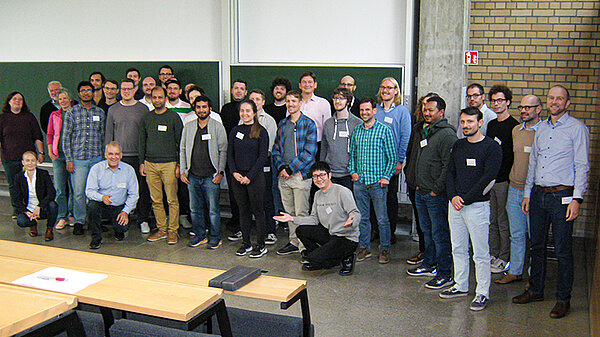
# UKRI Revamps PhD Training Schemes with Groundbreaking £500 Million Funding
In a pivotal move aimed at streamlining and improving the training of aspiring researchers, UK Research and Innovation (UKRI) has introduced two new programmes that will take the place of nine current doctoral training schemes. This significant shift will entail an investment of over £500 million to assist approximately 4800 PhD students over the next three years. The newly launched programmes seek to establish a cohesive funding model for PhD candidates across biological sciences, engineering and physical sciences, along with natural and environmental sciences.
## A Fresh Perspective on Doctoral Training
Traditionally, individual Research Councils under UKRI have provided unique doctoral training schemes, each operating with distinct funding frameworks, resulting in a complicated environment for prospective PhD students and academic institutions. Earlier this year, UKRI revealed plans to standardise the system by consolidating PhD studentships and early career fellowships under a unified UKRI framework. This integrated funding strategy aims to simplify the process and foster a more comprehensive approach across various research disciplines.
UKRI’s ambition for the future establishes the foundation for two new funding structures:
1. **Doctoral Landscape Awards**: These awards provide adaptable funding across a wide spectrum of research fields, enabling universities to swiftly respond to new academic concepts and discoveries. This adaptability encourages innovation and aligns with the rapidly evolving research requirements in science, technology, and more.
2. **Doctoral Focal Awards**: Conversely, focal awards are designated for particular thematic research issues. This focused strategy allocates resources to strategically important areas, facilitating progress in concentrated domains. Importantly, they address significant global issues, thereby making a real impact in tackling urgent challenges such as climate change and public health emergencies.
Both types of awards highlight partnerships with non-academic entities, with a minimum of 25% of studentships being provided through collaborative ventures involving industry, public-sector organisations, or non-profit entities. This cooperation promises to enhance PhD training by synchronising academic research with practical problem-solving capabilities.
## Strategic Allocation of Funding
### Natural Environment Research Council (NERC) and Biotechnology and Biological Sciences Research Council (BBSRC)
From January 2023, universities were invited to submit proposals for the initial round of doctoral landscape awards in a funding initiative co-managed by the **Natural Environment Research Council (NERC)** and **Biotechnology and Biological Sciences Research Council (BBSRC)**. A total funding allocation of **£293 million** will fund over **2,300 PhD students** across five application cycles at 21 universities.
Research areas encompass transformative domains such as artificial intelligence applied to bioscience, advanced food biosystems, and forefront exascale computing technologies aimed at fostering innovation in bioscientific research.
Commenting on the significance of the funding, Professor **Tom Mitchell**, an earth scientist at University College London (UCL), noted:
> “This substantial funding highlights the need to train the upcoming generation of researchers to tackle urgent global issues, including climate change, biodiversity decline, and ecosystem resilience.”
UCL has emerged as a significant recipient of the new doctoral landscape awards, obtaining funding for **65 environmental science PhD students** and **130 bioscience PhD students** for the upcoming five years. These esteemed programmes have already commenced accepting applications for studentships commencing in **autumn 2025**.
### Engineering and Physical Sciences Research Council (EPSRC)
The **EPSRC** has also taken a leading role in the distribution of doctoral training grants. By utilizing an algorithm that assesses previously secured EPSRC competitive research funding, **40 universities** were chosen for a total investment of **£279 million**, supporting **2,400 PhD students** over three annual cohorts.
Research initiatives in fields such as **renewable energy**, **manufacturing technology**, and **materials science** will greatly benefit from this funding. Furthermore, the funding strategies are set to be more flexible this time, enabling universities to pursue a variety of initiatives aimed at enhancing the impact of these studentships.
A primary goal is to improve *career mobility* across sectors and *broaden participation* in doctoral studies, promoting equitable access and exploration of new talent pools. EPSRC urges these institutions to adopt innovative recruitment strategies, internships, and postdoctoral support, ensuring PhD students optimise the value of their education.
## Merging Academia with Industry and Non-Academic Partners
A fundamental aspect of the new framework is the involvement of non-academic partners in shaping the student journey, guaranteeing that emerging researchers are exposed to the broader ecosystems affecting their fields. Both landscape and focal awards are constructed to enable **co-designed student projects** with contributions from businesses, governmental entities, and non-profit organisations, ensuring that the work of PhD students directly addresses real-world challenges.
One notable instance is the **NERC doctoral focal awards**, providing support for around **90 studentships** across three cohorts with a funding of £11.4 million. Among these, the **University of Sheffield**